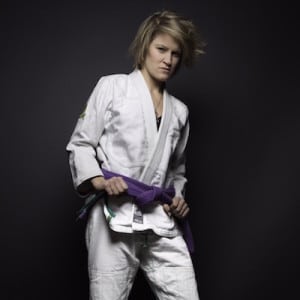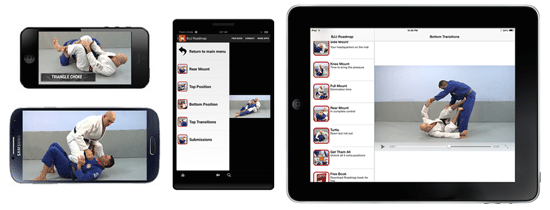Many people want to compete in BJJ but become absolute nervous wrecks in the days and weeks before the competition. They get unhappy, stressed out and sometimes even get physically sick before a big tournament.
A bit of stress is fine – it’s fuel for the engine – but too much isn’t good. If you can’t even breathe as you shake hands with your opponent then you’re probably not going to function at your best.
This article about is the result of a conversation I had with my email newsletter readership. In it readers share their best tips for effectively dealing with nervousness in BJJ competitions.
I’ll start with my own biggest breakthrough…
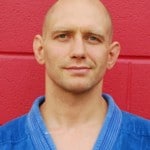 Back when I competed in BJJ I was a very nervous competitor. I would have to pee two, three, four times before a match (“Damn you bladder – I know for a fact that you’re empty!“). I would feel nauseous for days, and was an absolute grump to be around. I would only compete a couple times a year, and each time it was a giant deal.
Back when I competed in BJJ I was a very nervous competitor. I would have to pee two, three, four times before a match (“Damn you bladder – I know for a fact that you’re empty!“). I would feel nauseous for days, and was an absolute grump to be around. I would only compete a couple times a year, and each time it was a giant deal.
It wasn’t until the end of my competition career that I managed to get on top of this issue.
What was the cure? Well, it was MORE competition, not less.
I finally made major progress when I doubled down on competition. For a year I c BJJ and submission grappling, I was also racing in a tortuous event called the Firefighter Combat Challenge.
In the Combat Challenge – once billed as ‘The Toughest Two Minutes in Sports’ – you race through 5 stages wearing almost 50 lbs of gear and doing fun things like sprinting up stairs with heavy objects on your shoulder, advancing hoses, dragging 180 lb dummies, swinging sledgehammers, etc.
You’re doing this in front of your peers, the public, and – quite frequently – camera crews sent by ESPN. Usually I would feel like throwing up before the event from the nerves, and again after the event from the exertion. Fun times!
Let me get to the punchline. At the end of that year in which I was competing in BJJ tournaments AND Combat Challenge events I finally noticed a shift. Stepping onto the mat started to feel just a little bit like another day at the office. Through repeated exposure to the stress of competition and public performance I was finally beginning to become a little bit immune to it.
It was stress inoculation in action.
But for me it seemed that there was an expiration window for this desensitisation; it was a use it or lose it proposition. Frequency of competition was much more important than the total amount of experience accumulated. Competing 10 times in a year was MUCH more effective at getting nerves under control than competing twice a year spread out over 5 years.
Maybe that’s the real reason why many of the top BJJ competitors compete all the time. Yes, their sights are set on the big events – the Pan Ams, the Mundials, ADCC – but they’re usually going from tournament to tournament in the off season to0. Yes, they’re keeping their blades sharp, but maybe it’s also about keeping on top of excessive tournament-induced nervousness…
Stephan Kesting
Grapplearts.com
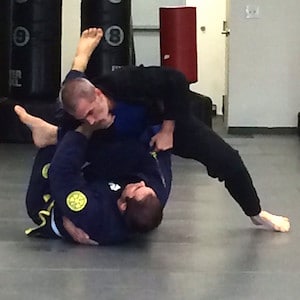 About me: I’m a 34 year old BJJ blue belt under Jamie Cruz, and I’m currently training out of AMA Fight Club in NJ under Professor John Helwig, one of Jamie’s first black belts. I’ve been training for about 3 years.
About me: I’m a 34 year old BJJ blue belt under Jamie Cruz, and I’m currently training out of AMA Fight Club in NJ under Professor John Helwig, one of Jamie’s first black belts. I’ve been training for about 3 years.
I competed (and won gold!) in the Executive division of white belt Gi at GrapplersQuest last year. Having never wrestled, the entire experience was new and overwhelming. From training preparation, to diet, to weight cutting, to day-of nerves, I didn’t have an ounce of experience in any facet of competition!
I’m not sure that there’s a secret method for making nerves go away…after all, we’re not out there playing pattycake.  So to get through it all, I stuck to the following tenets:
So to get through it all, I stuck to the following tenets:
1. TRUST YOUR TRAINING! In the weeks (and days especially) leading up to a competition, you’ll start second guessing yourself. You’ll wonder if you’re truly ready. Is my technique up to snuff? Is my cardio going to fail me? What if I adrenaline dump? From what I’ve read and discussed with experienced competitors, these worries are completely normal. The key is to not let self-doubt creep in and set up shop in your brain. You absolutely must believe in your training and coaches! It’s much like preparing for exams in school…you walk into the classroom with a sense of confidence that can only come from exceptional preparation. So key #1 is to prepare prepare prepare, and KNOW you’re prepared.
2. KISS (Keep it Simple, Stupid). In the weeks leading up to the competition, I broke my goals up into smaller, achievable milestones and focused on one goal at a time. This prevented me from feeling overwhelmed. A few weeks out, I made sure my weight was manageable, started my dieting changes, and refocused my training to “competition mode” (reduce frequency of risky or reckless moves, hold positions for at least 3 seconds, no more trying out new subs, etc.). One week out, I focused entirely on the weight cut and training my strengths. I honestly wasn’t thinking beyond weigh-ins on Friday; the weigh-ins were my first fight as far as I was concerned. After weigh-ins, I thought only about my first match and game planned to play to my strengths. The point is that you must attempt to control the runaway thought train, or you may beat yourself before you step foot on the mat. For me, this meant smaller goals to reach the big one!
3. PLANNING. In the days leading up to competition, make sure you are aware of route to the venue, division start times etc., and plan accordingly. No one likes to feel rushed, and absolutely NO ONE wants to feel rushed or stressed on the day they are going to fight multiple humans. So make sure you have an itinerary and stick to it. Get there early and know where the mats are, where warmup area is, etc. Make sure you have snacks with you that are appropriate for what you’ll be doing that day: I wouldn’t pack fried chicken, but I would definitely pack water and a couple of all natural granola bars and fruit. Plan a meet-up time with your teammates so you can support and encourage one another. Competitions are an amazing team-building event!
4. GO SLOW. Day of competition, start the day off slow. No rushing around like a madperson…all preparation is done, so all that’s left to do is to eat well, stay calm and hydrated, and get to the venue early and in one piece. The idea is to make the day as calm and stress-free as possible so that the only chaos you experience is the beautiful chaos that ensues when the bell rings!
Sorry if this was a little long but I just went through these tips with my brother when he first competed two months ago, and it seemed to help. The bottom line is that 99% of us will feel nerves. The key is controlling them through a combination of physical preparation and mental fortitude.
Thanks again for all your time and instruction Stephen, and please keep them coming!
Joe Coccia
AMA Fight Club
I am really interested to see what everyone has to say on this-I don’t feel like I am skilled in this area, but here is my best story:
My first purple belt comp was inordinately nerve-wracking. I have done a number of competitions before, have fought MMA, etc., but I never struggled like I did that day. My heart rate was elevated all morning, and no matter what I did, it stayed high. I also had the “last minute bathroom attack” that you hear about all the time. The line was too long, so I just told myself “Well, you’re going to have to suck it up”.
Right before I got on the mat, I noticed something-I noticed how little attention any one match was getting, and it dawned on me “No one is here to be focused on you; you’re the only one focused on that”. So, I got immediately calm and decided to roll just like I was in class. I lost by an advantage that day, but I was happy with how calm I felt. In the future, I plan to work on pulling the trigger a bit more at the right time during the match.
The lesson for me was that I was letting (imagined) external pressure ruin my own experience.
Anonymous
 I was a competitive high school wrestler. I’m currently a jiu jitsu blue belt and a recreation wrestling coach.
I was a competitive high school wrestler. I’m currently a jiu jitsu blue belt and a recreation wrestling coach.
When I was a wrestler, the name of my game was CONSERVATIVE. I didn’t want to mess up and get pinned, so I played a tight, low risk, low reward game. I was technically sound, and very strong for my weight, so my game worked moderately well. The problem was that the wrestlers at the highest levels were technically sound AND they took risks, so my game plateaued.
Fast forward 20 years, and since I’ve been training Jiu Jitsu, I’ve competed in the GrapplersQuest Nationals (twice,) the NAGA World Championship, a submission only Good Fight tournament, and a submission only event at my gym. In those competions, I’ve won my division in GrapplersQuest and NAGA, and placed second at a GrapplersQuest event.
I think there are two things that have helped me enormously in managing completion nerves. The first is to have a plan going in. In every match in every competition, I repeatedly visualize positions and techniques, and plan at least the first few exchanges. This process helps me to remove some variables from the match, some risk, and therefore some jitters.
The second technique that I only employed recently is to set unique goals. For example, at NAGA Worlds this year, here were my goals:
- Open up your game
- Make a couple of mistakes
- Relax
I didn’t include “win,” or “takedown” or any specific, more typical goals. And guess what? With these goals and a game plan I won both my matches by submission. More importantly, I was happy during the matches because my goals were easy for me to achieve. (As opposed to a goal like “win.”)
One final thing that I think it important: I always keep a very good diet, and I train consistently. Therefore, I don’t have the stress of a weight cut, or the ups and downs of cutting water weight. While this isn’t a direct point to the “competition nerves” topic, I think being on weight without stress helps the entire process.
Rob
The physicality of training and competition aside, I find that competition preparation is a primarily a mental exercise. Mat time will always be a constant requirement in training but the mental aspect is what sets aside a true competitor from a weekend warrior or couch ninja. While I am certainly not begrudging someone who is not inclined to compete, our sport does lend itself quite readily to testing our personal skillsets through competition.
I tend to incorporate 4 separate but interconnected concepts into my training in order to prepare for competition day. The old adage of “sweating during training prevents bleeding in combat” holds true in all aspects of our BJJ training. If a proper training regime is utilized which encompasses both the physical and more importantly the MENTAL aspects of preparation, then the actual act of combat (or in our case competition) becomes rudimentary and the cards just sort of play themselves out to victory.
As previously stated, I will not be addressing the physical training aspects of drilling, “repping” technique, and rolling. Rather, I will espouse how a proper mental training plan can yield excellent results and allow you to enter onto the competition mats with confidence
Goal Centered Training
First off, all training should be goal centered, including your daily training log. By setting goals we allow ourselves the ability to achieve them and this instills confidence in our abilities. By utilizing daily goals in your journal and training we allow ourselves the opportunity to examine our BJJ game for strengths and weaknesses. More importantly it ensures that we set priorities for our training which we can incorporate into our everyday activities on the mat. For instance on any day of training I will set an individual goal in regards to a concept, a technique, and a position goal. This allows me to focus on specific aspects of my training.
Examples of this inlude:
Concept – can be something as simple as control my breathing, work grips, deny grips, working towards my weak side, making opponent go opposite to the norm, triggers, slow and smooth, pressure, weight distribution etc. Basically a “small circle” type of improving your game
Technique – pick a technique and consciously hunt for it and attempt to trigger immediately upon seeing a suitable setup. Much like during the roll after a technique class we are all encouraged to hit the technique covered in class whenever possible
Positional – decide to work a position (top or bottom). This will increase your comfort level in regards to confidence in new positions.
Take note of your “lighbulb” moments and KEY elements of your training. They are what will bring you the to next level. This is the info that goes int eh journal for later review.
The FINAL goal of EVERY training session is the setting in place of your next training session. When this done it now requires conscious effort to cancel the session. As opposed to sitting on the couch and deciding if you wanna go train with now repercussions from anyone.
Game planning
The subject of game planning is well sourced. By developing a tentative game plan we eliminate the necessity for decision making during the match. If we already have a flowchart or template of where we want to bring the match then we are not required to make decisions once the fight/flight complex kicks in. The MAJOR aspect of a game plan is not having one, but rather drilling through it during lead up training. If done properly the game plan is ingrained into muscle memory and we can FLOW through the match.
The military saying of “a plan never survives contact with the enemy” is true but having a well thought out and drilled game plan can allow you to “switch gears” more readily once the situation unfolds. On a personal anecdotal level, a few years ago I competed in a local tournament and I had drilled so thoroughly that I was able to impose my game plan and the match ended in less than 3 minutes. It was only after that I realised that I had played my plan exactly as rehearsed. A true “lighbulb” moment
Fight simulations / adverse conditions
In the weeks leading up to match day the training will culminate in fight simulations. This is where the stresses of the match are simulated and the adverse conditions are brought to bear on the athlete. Fresh partners with no rest will bring the trainee to the point of exhaustion. This is where the drilled game plan enters and the body takes over and hopefully flows through the plan.
Another aspect is to create the adverse conditions. The ONLY person cheering or encouraging the athlete is his designated coach. This will implant his voice regarding instruction. Everyone else in the gym area will be verbally berating him, telling him he is tired and weak and cheering for his opponents. It is a terrible feeling to only hear negatives for you and positives for your opponent. By weathering the storm of abuse we learn to shut it out and only hear our coach
PMR/Breathing exercises / mental role playing
The final aspect of competition preparation is how to settle nerves on game day. Breathing, relaxation, and mental roleplaying can be of great benefit. Progressive muscle relaxation is a method to systematically learn to relax your body and seek out areas of tension and nervous ness. Breathing in general is autogenic in nature but we have the ability to take control of it and utilize breath control to steady our nerves.
Studies indicate that when a stress induced heart rate (as opposed to exercise induced) of over 165 is achieved then the brain switches to a less cognitive state as the fight flight complex manifests. This complex leads to loss of fine motor skills, auditory exclusion and tunnel vision. Further, we shut down the decision making process of our brain. Learning to control breathing allows us to lower our heart rate and become cognitive again.
Finally mental role-playing or visualizing the fight in full detail in our minds implants positive outcomes in our brain. If our visualizations are viewed in the same manner as we review reality the brain really cannot discern which is which. Therefore if we visualize positive outcomes in our imagry we can trick our brain into having the confidence it needs to pull it off in reality.
In summary, I firmly believe that the mental aspect of the game is every bit as important as the physical training. By incorporating the mental aspects of training into our physical training we create a synergy between the two systems. By setting goals we create confidence in ourselves and in our training preparation.
By understanding the stresses of competition day and taking steps to alleviate the signs and symptoms of stress we allow ourselves to compete at a higher level. The more we prepare the more confident we become. Success breeds success . Confidence in your training and developenment will reduce and alleviate nervousness on game day
Cheers,
GB
Here is my pre-competition routine. I don’t use it for BJJ but rather full contact Muay Thai. Anyway, I hope it helps some of your readers…
My ritual:
- During day – talk to no one. (Rigan Machado does this)
- Before the fight – Go to the toilet 3 times. After third time, I knew I was ready.
- Enjoy the nerves as it is natural and prepares me for competition.
- Just prior to entering the ring tell myself that its time to drop the anxiousness as it no longer serves me.
This is pretty simple, but it took me several fights with debilitating nerves to get this routine down.
Sean Allen
Two time state Muay Thai Title (Light heavy and Super light heavyweight)
Now – Brown belt BJJ
 I learned this from my own experience in my first competition, and from my teammates’ experiences too. This is a tip for how to not get nervous from being cornered.
I learned this from my own experience in my first competition, and from my teammates’ experiences too. This is a tip for how to not get nervous from being cornered.
When being cornered by a coach, instructions are typically conveyed in a loud, assertive tone – it sounds like you’re being yelled at, which in turn makes you think you must be performing really poorly. And thinking that during your competition makes you freak out and compete worse, not better.
After watching the video of my match, I realized that I performed exactly the way I expected I would (before the match began), and not as poorly as I assumed during the match. That’s how I realized that I was responding to the tone of my coach’s instructions, not the words.
The thing is, because it’s loud at the competition venue and your coach wants to make sure you are listening, he/she must yell like that.
At my second competition, I was able to hear my coach’s instructions just for their instructional value, and not as a judgment on my performance – and I won all 4 matches.
Molly
I wrestled from eighth grade through highschool. During that time a lot was mentioned about being in a ‘fighting state’, which essentially translated to being hangry (hungry-angry). And I do believe that you are more alert if you have to cut weight, provided that you have good muscle stores on the day of the fight. So now I just cut weight whether I have to or not.
I take a bag full of fruit and pasta, water, and whatever else I feel I will need to the tournament. Snuggie and headphone? Yeah, I have those sometimes to.
Also, the physiological hell that you go through cutting weight beats whatever you’re going to experience on the mats. Doing this work and preparation to be eligible to set foot on the mat takes my mind off of things I can’t control. I’m doing it right now in preparation for the New York Open.
Robert Noble
I’ve made my own music mix and carry it around with me on an iPod at competition (instead of a phone which I would have used to text or get distracted by).
Getting closer to the match I’d stay warm, jump around, and do some light warmups. Nothing too big or what I was planning on doing on the mats when in a match. Just keep my body moving and drown out all other noise with my personalised music mix.
Then I’d also grab a friend and do some pummeling with them.
Amie
Team 1 BJJ
I had about 6-7 fights as a white belt and I was nervous, almost weak with fear, before all of them! In my last 2 fights (with the gi) my grip gave out within minutes. I thought it was because of cutting weight, bad cardio etc. As it was, l won and received my blue belt – which meant that I now had to compete at a higher belt level in the national competition that I had being planning to compete in in 2 weeks time!!
Because I was in this higher belt class I figured I had no real hope of winning, so I went along for the fun, with no expectation of medalling; it was almost like a roll in another gym.
My grips lasted until the last minute of the 3rd fight (the final) which I won! All fights went the distance (one tap out with one second left). And there were no “other” cardio issues!
I read something/watched something online (I believe it was the Wintensity program by Eric Parker but not sure) that said something like “If you’re doing 8 rounds hard in the gym and gas out in competition, it’s NOT your cardio, it’s a lack of mental preparation.” I really believe that!
The only other significant change between the two competitions was that I had a game plan for the second competition, which again, may have led me to be more relaxed.
I really believe being relaxed helps you to control your breathing and save wasted energy through nervous tension combined with the massive initial adrenaline rush causing the “cardio” issues that are usually felt. I can’t help but think of James Thompson vs Aleksander Emelianenko!!
Gary
The goal before I compete is to relax as much as possible. I do a lot of static stretching and avoid doing things like bouncing around to warm up because I feel like this feeds into nervous energy compared to stretching which forces you to relax and helps avoid muscle pulls.
I also listen to quiet music instead of the loud stuff I usually like. My favorite song before a competition is “Planet Caravan” by Pantera or Black Sabbath.
Also, before stepping on the mat and while I’m walking out to shake hands, I put all of my focus on my breathing. That part is the most helpful thing I’ve done.
Anonymous
Although my competition experiences are limited to two tournaments (7 fights) my approach is primarily the following and works reasonable well:
- Believe in the art
-
Believe in your training and preparation
- Believe in yourself
- Remember, it’s just a competition, so it’s really not THAT important…
- Breath, try to not think at all
- Use sources that match your mindst, e.g. Ryron Gracies ‘Keep it playful’ mantra in my case, or Roy Dean’s interpretation of BJJ
Daniel Meyer
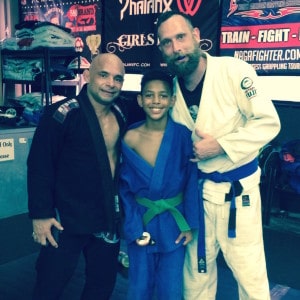 I’ve been a BJJ competitor for years. I too struggled with competition nerves. While I was working on my B.Sc. in Kinesiology, I had a great professor who was also a Judo competitor. One day we were talking about test anxiety. He said think about it as an opportunity to “show off”. He would call test days “show off days”. He suggested I do the same thing while competing.
I’ve been a BJJ competitor for years. I too struggled with competition nerves. While I was working on my B.Sc. in Kinesiology, I had a great professor who was also a Judo competitor. One day we were talking about test anxiety. He said think about it as an opportunity to “show off”. He would call test days “show off days”. He suggested I do the same thing while competing.
Changing the way you think about competition and turning it into something positive can be very beneficial. Remind yourself, this is what I practice everyday, now I get to show off what I know! Thanks Dr. House!
John
I have always looked at competition in any form, may it be BJJ, Football, Hockey or landing a job interview as a formality of what I have already believed I won. I constantly see myself with my Gi being torn apart and sweat running down my face with the referee raising my hand.
I run scenarios through my head like I am playing back a movie I’ve seen a thousand times before. When I get to the competition I am more interested in helping my team mates get ready and cornering them if they need support.
When its time for me to step on the mat I tell my self its time to run through the motions and get this over with. I channel my nervous energy into excitement and think about how scared my opponent is. Win, lose or draw I walk away from the mat broken, tired and accomplished. I will never let my self be depressed when I lose, because every time I step off that mat I know my opponent hopes he never has to endure the 5 minutes of torture he went through just to get his hand raised.
On several occasions I have had someone come up to me and tell me that was one of the hardest fought victories they have ever had. I am glad that I was able to help someone rise to a level that they never thought possible, and with that I am a winner!
Jared Talik
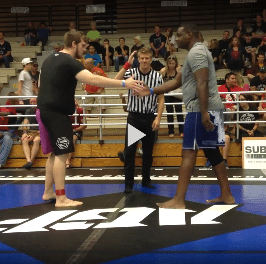 Your request for examples of how BJJ competitors deal with nerves probably wasn’t targeted at me since my BJJ experience is so limited, but I thought I would share my story anyway. Today, marks the 60th day since I started training. However, I wanted to compete after my 1st week and did compete in AGF Tulsa Open on June 13, 2015.
Your request for examples of how BJJ competitors deal with nerves probably wasn’t targeted at me since my BJJ experience is so limited, but I thought I would share my story anyway. Today, marks the 60th day since I started training. However, I wanted to compete after my 1st week and did compete in AGF Tulsa Open on June 13, 2015.
I made the decision to compete because the tournaments are organized by experience, age, and size. I knew after only having about 15 days of training that I knew almost nothing about BJJ. But I understood that I should always try to improve my position and if I found myself in a position I didn’t like, I could always tap. Plus, having this experience would help me with nerves in future matches.
I used to compete in boxing and would always be nervous during weigh in the night before all the way until the bell rung to start the match. Some anxiety was expected so I had no problem stepping on the mat that day.
During my first BJJ bout, I had a big adrenaline dump and was freaking drained of energy. Plus, I am 44 year old athlete that weighed 300lbs with only 1 month of training. No one in my division showed up. I rolled with big guys in their 20s that were intermediates. And guess what? I held my own for the most part. Two of my three matches went into sudden death. I didn’t win a medal, but I gained experience which is very valuable. So my suggestion for someone dealing with nerves is to compete and compete often. Do not add extra pressure by worry about winning. Get on the mat, roll, learn something, and fun.
Ché Kinnard (in the blue and gray)
I’m new to competing in BJJ, but grappled with the same problem during my 4 year career in wrestling. I would listen to music, joke with team mates, and write down all of my fears of losing and what would happen if I did. That last one was the biggest help by far; once you put it down on paper you realize it’s just a competition with nothing to truly lose: it just puts everything back into perspective. Sure, I was still nervous, but it helped me get through it and by the time I stepped on the mat, all I know was it was go time.
Parker Wadman
I’ve never competed in a BJJ competition, with the sport not popular in my area until after I “retired”, but I have competed all over the U.S. and in Ireland in karate. I know it’s a completely different sport, but competition is competition. I can imagine many young competitors (and older ones too) dealing with nerves and bladder issues during competition.
My way of coping during competition was to 1. Listen to copious amounts of heavy metal music & 2. Compete in as many as 9 divisions (I know the last one is not an option at grappling/BJJ tournaments).
For me, competition day wasn’t the day for extensive review and reminders about what I needed to do against a certain competitor. I feel like you should know what to do when it’s time to perform. If you, as a competitor are constantly freezing up during competition, you are not ready to compete. Once or twice, understandable, but as you continue to compete, preparation should start taking over.
I also enjoyed watching other people compete. This really helped at the larger tournaments I entered. Kickboxing matches were totally different for me. I honestly thought I’d crap my pants each time, but once I got in the ring, training took over. I’m not saying my kickboxing career is anything of legend, but I was fortunate to fight in front of people. Keep in mind, this was in the mid 90s. I was in my teens.
The hardest part for me, now as a coach, is having my son compete. I realize now that preparation of my competitor is my responsibility. He does compete in local grappling competitions, and karate tournaments. If he’s not ready, I have failed him. Not only him, but my whole team. He has his own way of dealing with nerves, and it works for him. If he, or any of my team fails because they messed up, that is on them. If they fail because they weren’t prepared, that is my fault.
Nerves are not always a bad thing. Sometimes, nerves can make a competitor more aware. Maybe they don’t get caught in a certain hold, or get hit because they moved the opposite way.
Tony Mitchell
When anxiety hits me, I grab a pen and papers (I prefer those in this case, it helps to focus) write down my thoughts in general, then start to focus on where and why I feel nervous or uncomfortable. Then I start sorting out what I deem rational and solvable. I physically put the rest aside and continue to write down what I can actively do to approach those fears, and start to plan when and where I will execute these approaches. Additionally I plan activities that either take my full concentration or relax mind and body.
And when I can’t write or relax I imagine the fight in every little aspect I can think of. My game plan, where I could screw up and how I could turn that around, how I utilize possible mistakes et cetera.
In the end I do everything I can to avoid thinking in those never-ending circles and get to a progressive line of thought, even if it is “Stop! No you don’t want to think about this, this leads to nowhere. Quick, what was the first thing that comes to your mind when you think about that Grapple Arts guy. Stephan Kesting is his name and he has an extremely motivational grin…. Stop you are drifting again, back to topic. Grin… associations… He made a video once, about BJJ in a Zombie outbreak, that was funny… ” you might get the idea.
It is hard work and a lot of discipline, but it does work for me.
Sönke
I also was paralyzed with fear and anxiety before competitions. I had a few personal breakthroughs that really helped though…
#1 I only competed for myself. When I competed for others (like coaches, family, training partners) it just added pressure that was unnecessary.
#2 I accepted I might lose. It sounds weird but going in accepting that you might lose it takes away the fear of losing. That in mind I made it my goal that even if I lost I would make it the hardest match my opponent has ever had. I usually won with that mind set. It allowed me to take chances without hesitation.
#3 Do it for fun. If you enjoy it, it doesnt seem like a forced situation that causes tension and stress.
#4 Realize everybody loses, and some do it on bigger stages with way more exposure and money on the line. If life goes on if these people lose then it really doesn’t matter if I lose.
James Duscio (brown belt)
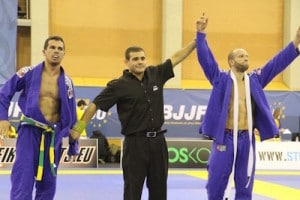 The one thing that helps me the most when it comes to dealing with competition nerves is actually acknowledging that I am nervous. Trying to fight that fact is a killer and it holds me back and stops me from performing. I accept I am nervous and tell myself that everyone else in my bracket is, I make a point of looking around the bull pen and telling myself that everyone there is nervous and that it’s completely natural. Then I ask myself “so what?”
The one thing that helps me the most when it comes to dealing with competition nerves is actually acknowledging that I am nervous. Trying to fight that fact is a killer and it holds me back and stops me from performing. I accept I am nervous and tell myself that everyone else in my bracket is, I make a point of looking around the bull pen and telling myself that everyone there is nervous and that it’s completely natural. Then I ask myself “so what?”
This understanding with my inner voice allows me to think more about what I will do on the mat and less about the other guy’s training, his game, and so on. You should only think about yourself and what you’ve done to get there. Win or lose, you’ve made sacrifices, paid your dues and you can do what you set out to do.
The pic is from back in 2013 when I was a white belt in my first European championship. I’m on the right and what my white belt mind did not realise is that the ref had been signalling me to tie my belt, hence his hilarious expression. You live and learn…
Rick ‘Thomo’ Thompson
I like to train as if my life is on the line; it helps to focus my training. On the day of competition I try to think “this is the fun part,” and “this is the game” – it helps to take any pressure off.
Training is the important part and competition is the fun part. Planing for the event is also a key for me: it is a lot less worry if you are not eating a hot dog when they call your name (which has actually happened to me). I ended up doing OK, but it was not much fun.
I also find using music or meditation before the match helps also.
Greg Alberts
In regard to competition nerves, I normally just do yoga stretches and short meditation sessions before my matches begin – it helps loosen me up while mentally keeping me calm and serene.
Before the competition, I also watch videos to help me visualize techniques, their most perfect form, and their various application, thus keeping myself busy so as to calm my nerves.
Nicolas See
Click here to find out more about Stephan Kesting’s FREE Roadmap for BJJ instructional app. It is available for Apple, Android and Kindle devices.
The post Dealing with Competition Nerves in BJJ appeared first on Grapplearts.

